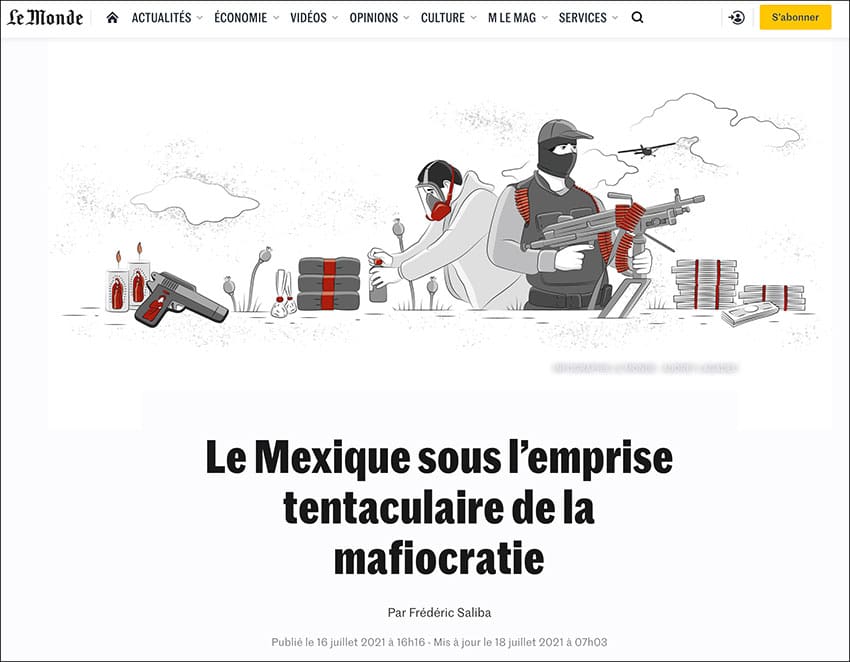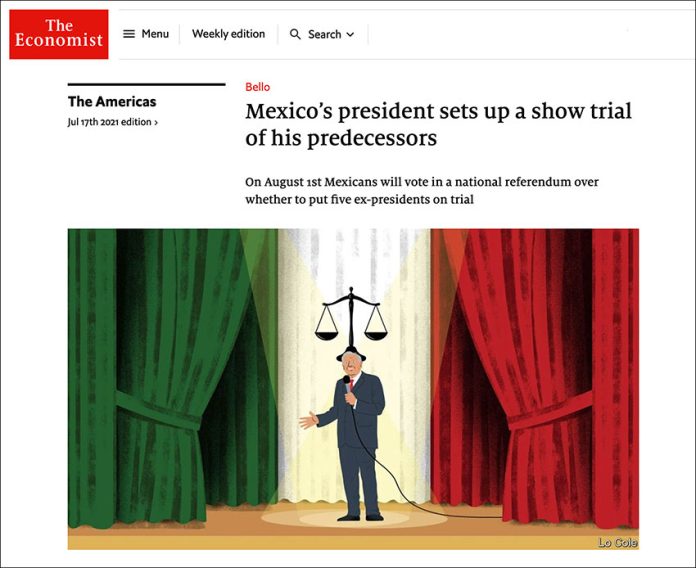Two prominent foreign newspapers have published unflattering pieces about Mexico in recent days.
Britain’s The Economist published a column under the headline “Mexico’s president sets up a show trial of his predecessors,” while France’s Le Monde published a report entitled “Mexico under the sprawling influence of mafiocracy.”
The Economist column was critical of the August 1 referendum at which Mexicans will be asked, in a roundabout way, whether the five most recent past presidents – blamed by President López Obrador for all manner of problems the country faces today – should be investigated for corruption.
The referendum question – translated by The Economist as: Are you in agreement or not that appropriate actions in accordance with the constitutional and legal framework be carried out in order to undertake actions of clarification of political decisions taken in the past by political actors, aimed at guaranteeing justice and the rights of the possible victims? – is one that “might have been devised by Cantinflas, a comic actor who turned the Mexican taste for circumlocution into an absurdist art form,” the British newspaper said.
“This is what President Andrés Manuel López Obrador wants Mexicans to decide in a national referendum on August 1st. Decoded, what it means is, should he be authorized to orchestrate a kind of unofficial show trial of his five most recent predecessors and their subordinates?”
The Economist asserted that holding a popular vote on whether someone should be prosecuted or not is a “travesty of the rule of law,” although it acknowledged that the Supreme Court, headed by an ally of the president, “narrowly ruled that the referendum was constitutional but softened the question to its current convoluted form.”
The newspaper said the staging of the referendum is “even more surreal” given that López Obrador, known commonly as AMLO, has indicated that he won’t vote because he prefers to look forward rather than dwell on the past – even though he frequently rails against his predecessors in his lengthy morning press conferences.
The president has said that he will respect the will of the people and seek to hold his predecessors to account for alleged acts of corruption if that’s what citizens want. The referendum will have binding force if 40% of eligible voters participate and a majority supports it. But whether the 40% threshold will be achieved is unclear as opposition parties are boycotting the vote.
The Economist said the referendum “serves several of the president’s purposes.”
“He is fond of consultative votes. They support his claim to take more notice of the people than his predecessors did. He has used them to provide backing for decisions he wanted to take anyway, such as the cancellation of a half-built new airport in Mexico City,” the column said.
“… The vote also confirms that, in fighting corruption, AMLO prefers theater, which he can direct, over substance,” The Economist said.

It argued that López Obrador – despite his own grandiose proclamations – has failed in the fight against corruption. The newspaper quoted María Amparo Casar of Mexicans Against Corruption and Impunity, who said: “Corruption in Mexico is in robust good health. There is talk against corruption but there is no anti-corruption policy.”
Citing the results of last month’s elections, at which the ruling Morena party lost its supermajority in the Chamber of Deputies but retained control of the lower house with the support of its allies, The Economist acknowledged that López Obrador remains popular but claimed that he is “no longer invincible.”
“Many Mexicans continue to think he is on their side. But they are suffering from the pandemic, the government’s mishandling of it and the related economic slump, as well as unabated violent crime. To distract attention from policy failures, their president needs all the Cantinflan spectacles of political theater that he can muster,” it concluded.
Meanwhile, the Le Monde report focused on Mexico’s security situation with particular emphasis given to political violence in the lead-up to the June 6 elections. It looked at the case of Alma Barragán, a Citizens Movement party candidate in Moroleón, Guanajuato, who was murdered 12 days before the election.
One of Barragán’s sons has links to the Jalisco New Generation Cartel, Le Monde said, citing an investigation it said was slated to remain confidential.
“Was Alma Rosa Barragán a narco-candidate or was there an attempt to discredit her to justify the murder?” security expert David Saucedo questioned in an interview with the French newspaper.
Le Monde noted that more than 140 politicians and candidates were murdered during the election period and that criminal organizations were able to influence the electoral process and its results.
The Le Monde report also cited a United States military official’s claim earlier this year that 30-35% of Mexico’s territory is controlled by drug cartels. Among the episodes of violence it recounted was the wave of cartel attacks in Culiacán in October 2019 that were triggered by the arrest of Ovidio Guzmán, a son of former Sinaloa Cartel leader Joaquín “El Chapo” Guzmán.
The newspaper’s “mafiocracy” headline was derived from an interview with United States-based organized crime expert Edgardo Buscaglia.
“Citizens’ votes have less weight than the influence of the mafias [drug cartels],” he told Le Monde.
“… To influence the [election] results, the drug cartels have instilled fear and spilt blood, methods that … are only the visible part of Mexican narco-politics, whose expanding networks give this federal republic the air of a mafiocracy,” the report said.
Mexico News Daily
